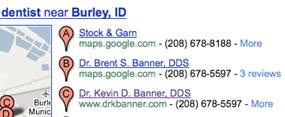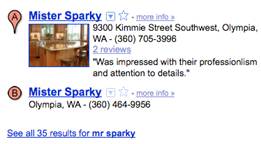As I was perusing through some updates on twitter the other day I came across an Alan Bleiweiss article entitled CONVERSION OPTIMIZATION IS THE NEW BLACK. Now, not only did the article have an extremely catchy and trend-a-rific title, but Alan really hit the nail on head by explaining (and I paraphrase and twist) that in the early days of SEO it was all rankings, click-through’s, and bounce rates. But, as SEO’s continue down the path of perfection the industry benchmark is becoming Conversion Optimization and everything else gets to stand on the 2nd place platform.
I ended up having a great comment section conversation with Alan about some issues with Conversion Optimization in the local search sphere and realized that the dialogue needs to be opened to the search community as a whole for discussion.
The list below contains the 4 hardest things about tracking and optimizing conversions for local search. I would love feedback in order to come up with some of the best possible solutions, and hear any more struggles people are having with this process.
1. Most Sales Take Place Off Line and away from any Javascript Code.
How many final sales for restaurants, doctors, or hardware stores take place online? Of course there are tracking phone numbers (we will talk about this later), contact forms that can be “goaled”, etc. But ultimately, they don’t track a sale, the amount each sale is worth, exactly when it the sale took place, or various other forms of information those in the e-commerce industry can figure with a nice snippet of code.
One of the “a-ha” experiences in Internet Marketing I had was in college when I had to track an online sale from keyword to purchase. I remember thinking, “I know what you typed, I know what you looked at, I know what you spent, and I know what I need to do to get more of you suckers to buy my product!” It was a very satisfying feeling and one I wanted to enjoy over and over again.
Well, that feeling isn’t always the case with local search. Continue on to find out why.
2. “How did you hear about us” only comes true in Fairy Tales.
The most popular form of advertising tracking in America today (according to a recent no-brainer from Mike Ramsey) is simply to ask your customers where they found you. The problem is that most organizations have tons of different people that might answer phones, and the way that a possible customer is asked the question largely determines the answer given. For instance, a question started with “Where did you see us?” will result in more people talking about driving by, or seeing it on TV. “Where did you hear about us?” will result in more people saying on the radio or from a friend. Wording is important to ensure total accuracy, and wording is a hard thing for people to get right. Some more issues are that employees might forget to ask the question, they might write the data and lose it, or various other “dog ate my conversion” type happenings.
I do think that if Local SEO’s can stress “pen and pad” customer sales tracking to a company enough, they might make a spreadsheet and implement an exact wording, and exact form for tracking leads + sales and amounts. But, you still don’t see the search terms that the customer typed, or have a clue what they did on the page. Also, my experience with trying to get companies to do their own call tracking goes like this…
- Train Client
- Implement System for them to follow
- Test
- Leave them to it
- Find that the system has been tampered with, changed, and is broken
- Bang head on wall and start at “a”
That is when I change a familiar quote to the following…
“If you give a man a fish you can feed him for a day….If you teach a man to fish then he will just sit on the bank and drink beer unless you are there to keep holding his hand.”
You can come up with the perfect system, but adding people to it somehow ruins the entire process.
3. Call Tracking Numbers + Local Map Optimization = A great idea…just like the Titanic.
The best idea (in theory) to getting a solid idea of how your online campaigns are producing leads+sales is call tracking implemented with web analytics. The data is not dependant on a secretary remembering to ask the “golden question”. You can listen in on phone calls and find out how well the sales team is doing. You can even track individual campaigns with a specific phone number to drill down. Call tracking seems to be the best solution for offline businesses. The only problem is trying to use call tracking with a Google Places listing is like aiming a big boat at the tip of an iceberg without realizing that a big old mamma is under water waiting to sink you. Rankings in maps are built around the quality and quantity of places that a business’s name, address, and phone number are found across the web.
Let me say that again in all caps incased you missed it….
Rankings in maps are built around the quality and quantity of places that a business’s name, address, and phone number are found across the web.
This information needs to match up on every directory, page, and place that search engine spiders visit in order to ensure all the data gets linked to your business profile. Since call tracking numbers are different than the true business phone number, here are the possibilities of what could happen.
1. Using an image based call tracking number like My Next Customer ‘s system on a website would ensure that no search bots found the number and ended up with confused phone call data. But, many people call the numbers found right on the map listing in search results so you wouldn’t truly be tracking all your local search calls.

The number on your listing has to be same number distributed throughout the web. If not, then you might end up with duplicate listings as the search engine might think that the phone number represents a totally different business.
2. Switching all numbers you publish online (IYPs, Directories, and Websites) to a single local call tracking number is another option. If you do this, then you might avoid duplicate listings for a while. But all of your internet funnels would fall under one number limiting the amount of specific tracking you can do. Also, offline YellowPage’s that have a different phone number listed in the book might re-add that phone number to their online site and bam, duplicate listing issues.

Of course with one add of a column Google Places could fix this faster than a tire change during the Daytona. The column would simply be… “Phone Number you would like to display on your listing”. Then they could still use the real number for data purposes but add the option to use a phone number to track a listing and get some real use from Google Voice. Will this happen? I sure hope as that day I will finally be out of tracking woes and I will do a happy dance for conversions.
4. If you ain’t got the money, honey. I ain’t got the time.
The biggest problem for most small business companies that use local search is they get what they pay for, and they don’t pay for much. If a company is going to hire a local search marketing expert and expect a sweet conversion optimization tracking system, then they are going to have to pay for it. In local search, there are not a ton of small businesses that can afford, or see the true value in rich tracking because it is something they have spent so little time with in their other advertising methods. This is not the case for every small business but seems to be for a vast majority.
I hope that local search will soon see a lot better Conversion Optimization methods come in to practice. But, I also see that “rankings” will still be extremely important and the focus for most small businesses. At this time I don’t think I would sacrifice rankings for the ability to use call tracking and fall off of the map. There are a lot of great platforms that have great conversion optimization abilities, I just look forward to the day we are able to see the same with maps. Until then, make sure you have your pen and pad handy.




